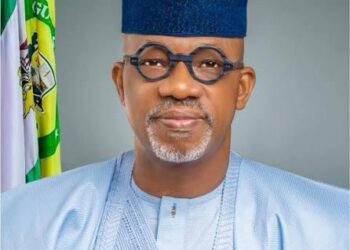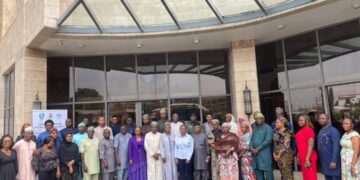Friday Sermon: Let Our Leaders Fear Allah And Lead By Example!
By Imam Murtadha Gusau
In the Name of Allah, the Entirely Merciful, the Especially Merciful
Praise is due to Allah, Lord of the worlds, may the blessings and peace be upon our beloved master Prophet Muhammad, the last of Prophets, on his family, and all his companions.
Dear brothers and sisters! People are always asking a quetion. Imam, please what makes a true leader?
The life of our beloved Prophet Muhammad (Peace be upon him) offers profound answers.
Leadership is one of the most debated and studied topics in history, with countless theories and frameworks outlining what makes a leader truly effective. From modern CEOs, to presidents, to head of states, to military generals, to governors, to local government chairmen, leadership has often been associated with power, influence, and authority. But when you study the life of one of history’s most influential figures—Prophet Muhammad (Peace be upon him)—you find a completely different, deeply human, and profoundly inspiring model of leadership.
Prophet Muhammad (Peace be upon him) didn’t lead with a crown or sword; he led with character, compassion, and a vision that transformed not just a small nation but the entire world. Over 1,447 years later, his leadership principles are still studied and revered across cultures. What makes his leadership so timeless? Let’s explore a few key aspects:
One of the most striking qualities of Prophet Muhammad (Peace be upon him) was his unwavering commitment to serving those he led. Unlike many leaders of today, who seek power for personal gain or recognition, he viewed leadership as an opportunity to uplift and empower others. In fact, he famously said:
“The leader of a people is their servant.”
He was often seen engaging in tasks with his companions that most leaders of his stature might have considered beneath them. Whether it was helping to build a Mosque, carrying bricks, or tying his own camel, Prophet Muhammad (Peace be upon him) demonstrated that no act of service was too small for a true leader. This humility made him not just respected but beloved by his followers.
In today’s world, where leadership often seems synonymous with control and authority, this model is a powerful reminder that the best leaders don’t just direct—they support, nurture, and elevate those around them.
The Prophet Muhammad (Peace be upon him) was a master of emotional intelligence long before the term even existed. He had an incredible ability to understand the emotions, needs, and concerns of those around him. This empathy wasn’t just an innate trait; it was a conscious practice in his leadership.
Whether dealing with friends, family, or even adversaries, he always sought to understand their perspectives, often diffusing conflicts with a few carefully chosen words. He was patient, and kind, and took the time to listen to others, which allowed him to build trust and loyalty among his followers.
In a world where leaders are often criticised for being detached or out of touch, the Prophet Muhammad’s (Peace be upon him) example of empathy is more relevant than ever. It reminds us that leadership is not just about making decisions—it’s about deeply connecting with and understanding the people you lead.
Prophet Muhammad (Peace be upon him) had a vision far beyond the immediate gains or losses of his time. His mission was not just to establish peace and justice for his people, but to build a society based on ethical values that would endure for generations. His leadership wasn’t reactive—it was proactive and deeply rooted in a long-term vision of what could be achieved.
Even in times of hardship, he never lost sight of his broader goals. He taught his followers to have patience, perseverance, and faith in the face of adversity. His long-term vision is evident in how he united the Arabian Peninsula, transforming a fractured region into a strong, ethical society.
In our fast-paced world, where short-term results often take precedence over long-term vision, Prophet Muhammad (Peace be upon him) teaches us the value of thinking beyond the immediate. Great leaders keep their eyes on the bigger picture, building legacies that stand the test of time.
In a time when corruption and dishonesty were rampant, Prophet Muhammad (Peace be upon him) was known as Al-Amin (the Trustworthy) long before he became a Prophet. His reputation for honesty, fairness, and moral integrity was one of his strongest leadership assets. Even his enemies could not deny his trustworthiness and fairness.
His leadership was always aligned with his values, and he never compromised on ethics, even when it was difficult or unpopular. He embodied the principle that great leaders must be willing to make difficult decisions based on what is right, not what is easy or advantageous.
In today’s complex world, where ethical leadership is often lacking, the Prophet Muhammad’s (Peace be upon him) unwavering commitment to truth and justice serves as a timeless reminder that leadership built on a foundation of strong ethics will always endure.
Prophet Muhammad (Peace be upon him) was inclusive in his leadership, treating everyone fairly regardless of their status, tribe, race, region, language, background, or beliefs. He advocated for the rights of women, children, orphans, and the oppressed at a time when such ideas were revolutionary. His leadership was not reserved for the elite only but extended to all people, emphasising the idea of unity and equality in the nation.
This inclusiveness made him not just a leader of Muslims but a leader of all humanity. In today’s diverse and globalised world, inclusivity is one of the most critical components of effective leadership, and the Prophet’s example offers a powerful model for creating cohesive and just communities.
Another remarkable leadership quality of our beloved Prophet Muhammad (Peace be upon him) was his adaptability and wisdom in addressing different situations. He wasn’t rigid in his approach. Instead, he was flexible, and pragmatic, and always sought the best solution for his nation. This ability to adjust and respond with wisdom is one of the hallmarks of great leadership.
In an era of constant change, leaders who can adapt, innovate, and guide their people through uncertainty are the ones who succeed. Prophet Muhammad (Peace be upon him) exemplified this adaptability, using wisdom and foresight to navigate complex challenges while staying true to his principles.
Today, leadership is often framed in terms of power, influence, and success. But when we look at the example of Prophet Muhammad (Peace be upon him), we see a different kind of leadership—one rooted in service, empathy, and unwavering ethical commitment. His life offers a powerful model for anyone looking to lead not just with authority but with compassion, humility, and a long-term vision.
In a world that desperately needs leaders who can inspire positive change, the leadership lessons of Prophet Muhammad (Peace be upon him) are more relevant than ever. His example reminds us that true leadership is about lifting others up, staying grounded in ethical principles, and building a vision for a better future.
Respected brothers and sisters! What is the meaning of leading by example? Leading by example means demonstrating the behaviours, values, and principles you want to see in your team, in your organisation, in your state, in your local government, in your constituency and in your country. It sets the tone for the work culture and inspires others to follow suit. The only disclaimer I would throw out is that, ideally, you are setting an example worthy of following. If so, please read on…
Leading by example can be a powerful way to gain the trust and respect of those around you. When leaders walk the talk and uphold high standards, they earn the trust and respect of their team members. Employees are more likely to respect and trust a leader who leads from the front.
When you have gained that trust and respect, it increases your ability to influence. Leaders who embody the values they espouse are highly influential. Their actions speak louder than words and profoundly impact team member’s behaviour and attitudes. Further, it fosters alignment between the leader’s vision and the team’s actions.
A less obvious upside of leading by example is improved accountability. Believe it or not, holding oneself accountable sets a precedent for accountability within the team. It encourages individuals to take ownership of their responsibilities and actions. Observing a passionate and dedicated leader can motivate team members to give their best effort and go the extra mile.
If you want to see a team with a growth mindset – start by having one yourself. Leaders who lead by example foster a culture of continuous learning and improvement. They encourage their team to develop new skills and embrace personal growth. Knowledge is power, and having it will create a more resilient team and individuals. Resiliency is essential during challenging times and can inspire others to persevere and maintain a positive outlook even in difficult situations.
Leaders need to recognise that their actions are constantly being observed and have a tremendous impact on the organisation’s culture and their team’s performance. Consistency and authenticity are crucial elements of effective leadership through leading by example.
Leaders should strive to be role models, communicate transparently, listen actively, and maintain open lines of communication with their team. By embodying the values and behaviours they wish to cultivate in their organisation, leaders can create a positive and thriving work environment that fosters growth, innovation, and success.
Fellow brothers and sisters! Here are the differences between weak and strong leaders:
The weakest leaders don’t build organisations, states, local governments or countries. They build parties around empty victories.
I’ve seen leaders celebrate milestones that weren’t really milestones at all.
– Submitting a form.
– Receiving a certificate.
– Announcing an award with no real foundation.
And yet… the cameras rolled. The speeches started. The applause filled the room.
But nothing had truly shifted.
No stronger culture.
No deeper engagement.
No better outcomes for people or customers.
This isn’t leadership.
It’s theatre.
I call it Snap Leadership; recognition without reality.
Real leaders don’t measure success in trophies or headlines. They measure it in:
– How people feel at work.
– How customers experience the brand.
– How trust holds up when the spotlight fades.
Because here’s the truth:
Fake leadership dies the moment the applause stops. Real leadership echoes long after the room is silent.
Dear brothers and sisters! Know that, leadership has limits. It is not a licence to trample on others.
There are plenty of verses in the Qur’an about leadership and the importance of the leader in the nation.
At the same time, we also have plenty of Hadiths in the Sunnah which define the responsibilities and boundaries of leaders. Therefore leadership is not a blank cheque to do what you want.
In the Hadith, Aisha reported that the Prophet Muhammad (Peace be upon him) said:
“O Allah, cause distress to him who has any charge over my people and causes them distress, and be gentle to him who has any charge over my people and is gentle to them.” [Muslim]
When we read this Hadith, and there are many like it, we see that power comes with limits, any one in a position of responsibility, whether they are a father or mother, boss, head teacher, prime minister, head of state, president, governor, king or local government chairman, has authority over others and the opportunity to use the power for good or evil. They can use their power to oppress, manipulate and bully others into doing what they want. They can overstep the limits of their position.
No wonder among the Qur’anic verses of Surah al Alaq, which was the first surah to be revealed, Allah Almighty said:
“In fact, the human being oversteps all bounds. When he considers himself self-sufficient. But to your Lord is the return.” [Qur’an, 96:6-8]
Humans are susceptible to using power, money, authority or status to adverse effect, as tools of control. However leadership is not a licence to coerce others.
My fellow servants of Allah! There are two types of leader in general – strong and weak. To many people’s mind, the strong leader is the one who is domineering, dictatorial and autocratic.
He forces others to get what he wants through a mixture of threats and aggression. He penalises those who don’t follow his commands.
Ironically, this is a weak leader not a strong leader. He might think he is asserting his authority but in fact, he is weak. He leaves his staff or team or subordinates disenfranchised, disengaged and disillusioned or worse victimised and harassed.
Much research has been done on leadership styles by businesses and psychologists. Their findings support the Qur’an’s evaluation of good and bad leadership. Autocratic styles of leadership, typified by Pharaoh (Fir’aun) and other tyrants and dictators, where the leader make decisions without the input or consent of his subjects, may achieve their aims in the short term, but end in failure.
By contrast, the strong leader is the one who is kind and gentle. Leadership should not be characterised by oppressiveness, tyranny, dictatorship and bullying. It is not about showing your might, rather the best leaders listen to others and can admit their mistakes. They have real conversations with others. Their leadership is not based on ‘My way or the high way!’
No doubt, the best leader is the Prophet Muhammad (Peace be upon him). The Qur’an highlighted the quality of his gentleness as being effective in winning people’s hearts and minds and bringing positive change. This would not have been achieved by heavy-handedness. Allah Almighty says:
“Only through the Divine Mercy have you (Muhammad) been able to deal with your followers so gently. If you had been stern and hard-hearted, they would all have deserted you a long time ago.” [Qur’an, 3:159]
Thus we see that the Prophet Muhammad (Peace be upon him) with all his gentleness was in fact the strongest leader.
Good leadership achieves progress and success for the individuals and the organisation. Great leadership inspires, motivates and enables its team to grow and develop. They feel motivated and are productive and successful.
The best leaders are visionary, but rather than dictating to their team, they communicate effectively, gain trust, nurture growth and build on the strengths of their team.
I have come across many people who used to be humble until they came to power, and overnight they transformed into unrecognisable leaders, shouting and arrogant. What was on the chair they sat on? Poison or magic? I don’t know!
Don’t let power unleash the evil in you. If you have power, it comes with responsibility and accountability.
The Prophet Muhammad (Peace be upon him) made a Du’a for gentle leaders. He asked Allah to be gentle to them in return. And conversely, he asked to be harsh to those who are harsh to their subjects.
Ultimately, no one will get away with behaving badly, being oppressive or harsh towards others. Allah Almighty will hold everyone to account and question each person about every single action and distress they causes. Had the leaders known they would meet Allah Almighty, they would have acted differently.
Let our leaders try to be strong leaders. Let them show gentleness towards others. May Allah enable us to be among those people and be fair and just leaders and not leaders who deliver injustice.
Respected brothers and sisters! Here are also the differences between Islamic leadership and Western leadership (Democracy):
After deep research and investigation I’ve noticed a fundamental differences between how the West defines leadership and how Islam guides us to lead.
Western Leadership Culture:
“I want to BE a leader”,
Focus on climbing the hierarchy,
Leadership as a destination,
Titles and positions define authority,
Success measured by followers and influence.
Islamic Leadership Wisdom:
“I want to DO meaningful work”,
Focus on serving others,
Leadership as a journey of service,
Character and contribution define authority,
Success is measured by work worthy of Allah’s sight.
Fellow servants of Allah! In my role as an Imam for over thirty years (30 years), working alongside leaders from all levels, I’ve seen this play out countless times. The most effective “leaders” aren’t necessarily those with the fanciest titles. They’re the ones who:
● Solve problems others can’t.
● Mentor colleagues without being asked.
● Take ownership when things go wrong.
● Celebrate other’s successes genuinely.
● Work with integrity even when no one’s watching.
The Qur’an teaches us that:
“And say, “Do [as you will], for Allah will see your deeds, and [so, will] His Messenger and the believers. And you will be returned to the Knower of the unseen and the witnessed, and He will inform you of what you used to do.” [Qur’an, 9:105]
Notice, here it doesn’t say “Lead!” It says “Work!”
The beautiful truth? When you focus on doing excellent work that serves others, leadership finds you. People naturally turn to those who consistently add value, not those who chase titles.
As Islamic professionals, we have a choice:
Promote the “leadership obsession” culture OR Cultivate environments where meaningful work is recognised and rewarded.
I’ve learned that the best past leaders weren’t those who came in saying “I want to lead your team.” They were those who said “I want to solve this problem” or “I want to help people grow.”
The shift in mentality changes everything:
Instead of “How can I get promoted?” → “How can I add more value?”
Instead of “Who can I network with?” → “Who can I serve or learn from?”
Instead of “What’s my next title?” → “What’s my next contribution?”
Islamic leadership isn’t about being perfect – it’s about being sincere in your service to Allah and His creation.
Now what’s your experience? Have you noticed the difference between those who seek leadership versus those who focus on meaningful work?
Fellow Nigerians! When unhappy with their leaders, Muslims should stand firm for justice, pray for guidance and change, and offer sincere advice in a wise and peaceful manner. They should remember that obedience to a leader is conditional on that leader obeying Allah, and that all people, including leaders, are accountable to Allah. The focus should be on personal piety, patience, and continuing to seek and advocate for justice and accountability.
When people are unhappy with their leaders, it’s often due to a perceived lack of trust, respect, and empathy. This can manifest as a feeling of betrayal from scandals or a disconnect between leaders and the people they lead, where decisions seem to prioritise personal gain over collective benefit. Other issues include a fear of change, poor communication, or a lack of competence and courage in leadership.
When unhappy with leaders, Islamic guidance encourages Muslims to focus on self-improvement through taqwah (consciousness of Allah) and tawakkul (trust in Allah), work hard for what they want, and seek justice and accountability from leaders without seeking to divide the nation. Instead of dwelling on dissatisfaction, individuals should work on their own character and hold leaders accountable for upholding justice and acting with integrity and responsibility, as leadership is a trust (Amanah) from Allah.
Finally, the Messenger of Allah (Peace be upon him) said:
“Allah does not punish the individuals for the sins of the community until they see the evil spreading among themselves, and while they have the power to stop it, do not do so.” [Ahmad]
Imam Ibn Taimiyyah said:
“This is why those who are in authority (leaders) are of two groups: the Islamic scholars and the leaders in authority. If they are upright, the people will be upright; if they are corrupt, the people will be corrupt.”
Allah the Most High says:
“And O my people! Give full measure and weight in justice and reduce not the things that are due to the people, and do not commit mischief in the land, causing corruption.” [Surah Hud, 11:85]
Allah Almighty also says:
“And incline not toward those who do wrong, lest the Fire should touch you, and you have no protectors other than Allah, nor you would then be helped.” [Surah Hud, 11:113]
And lastly, Bill Bradley said:
“Leadership is unlocking people’s potential to become better.”
Wassalamu alaikum wa rahmatullah wa bara ka tuh
All praise is due to Allah, the Lord of the worlds. Prayers, peace and mercy are upon our beloved master, Prophet Muhammad, the son of Abdullah (Peace be upon him), his family and Companions.
Murtadha Muhammad Gusau is the Chief Imam of Nagazi-Uvete Jumu’ah and the late Alhaji Abdur-Rahman Okene’s Mosques, Okene, Kogi State, Nigeria. He can be reached via: gusauimam@gmail.com or +2348038289761 or +2348024192217.
This Jumu’ah Khutbah (Friday sermon) was prepared for delivery today, Friday, Jumadal Ula 02, 1447 AH (October 24, 2025).
(vitalnewsngr.com)



















